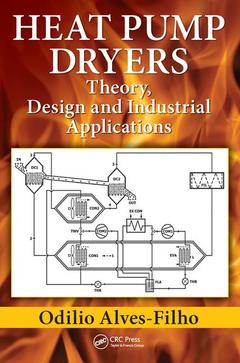Heat Pump Dryers Theory, Design and Industrial Applications

Explore the Social, Technological, and Economic Impact of Heat Pump Drying
Heat pump drying is a green technology that aligns with current energy, quality, and environmental concerns, and when compared to conventional drying, delivers similar quality at a lower cost. Heat Pump Dryers: Theory, Design and Industrial Applications details the progression of heat pump drying?from pioneering research and demonstration work to an applied technology?and establishes principles and theories that can aid in the successful design and application of heat pump dryers.
Based on the author's personal experience, this book compares heat pump dryers and conventional dryers in terms of performance, quality, removal rate, energy utilization, and the environmental effect of both drying processes. It includes detailed descriptions and layouts of heat pump dryers, outlines the principles of operation, and explains the equations, diagrams, and procedures used to form the basis for heat pump dryer dimensioning and design. The author also proposes the use of heat pump dryers that operate on natural fluids and considers their potential for providing ecological benefits and easing environmental issues relative to conventional drying. The use of natural fluids in heat pump dryers is consistent with the Kyoto and Montreal Protocols.
Highlights includes coverage of:
- Single-stage and multi-stage vapor compression heat pumps for drying
- A dryer design utilizing single-stage vapor compression heat pumps
- Design of a two-stage vapor compression heat pump for drying green peas and aromatic leaves
- Psychrometry of humid air and includes the various types of humidification processes
- Thermodynamic properties of refrigerants for heat pumps
Heat Pump Dryers: Theory, Design and Industrial Applications discusses the ready-to-use technology of heat pump drying. The book compares conventional and heat pump drying, addresses the confines and limitations of conventional drying, and proposes viable solutions using this novel process.
Conventional and Heat Pump Drying: Benefits and Drawbacks.Single-Stage Vapour Compression Heat Pumps for Drying. Multistage Vapour Compression Heat Pumps for Drying. Design of Single-Stage Vapour Compression Heat Pump Drying. Design of Two-Stage Vapour Compression Heat Pump Drying. Psychrometry of Moist Air Applied to Water Removal and Energy Consumption. Thermophysical Properties and Selection of Heat Pump Fluids. References and Additional Readings.
Prof. Odilio Alves-Filho earned his master’s and PhD degrees in mechanical engineering from the University of California, Davis, and the Norwegian University of Science and Technology, Trondheim, Norway, where he is a professor and chair for the
advanced PhD course in heat and mass transport in porous media. He is a former dean of the Faculty of Mechanical-Electrical Engineering, head of the Center of Excellence in Dewatering, and CEO of Innovative Drying Tech. He co-authored the Ramalho and Alves-Filho Model, has authored approximately 300 papers, two books and numerous book chapters, and is also the editor of eight academic proceedings.
Date de parution : 09-2015
17.8x25.4 cm
Mots-clés :
Heat Pump Dryer; Heat Pump; Drying technologies; Vapour Compression Heat Pump; Food Processing; Superheated Vapour; Green Technologies; Fluidised Bed Heat Pump Dryer; HVAC; Heat Pump Cycle; Energy Efficient Drying; Transcritical Cycle; Single-Stage Vapour Compression; Mollier Diagram; Single-Stage Vapor Compression; Compression Heat Pump; Laws of Thermodynamics; Refrigerant Mass Flow Rate; Carnot Cycle; Saturated Vapour; Isentropic and Non-Isentropic Saturated Vapour Compression; Heat Pump System; Isentropic and Non-Isentropic Saturated Vapor Compression; Energy Recovery; Dry-Expansion Evaporator; Mass Flow Rate; Basic Vapour Compression; Drying Chamber; Basic Vapor Compression; ASHRAE Handbook; Drying Channels; State Points; Flooded Evaporator; Bubble Point; Internal Heat Exchanger; Blower Work; Multistage Vapour Compression; Multistage Vapor Compression; Psychrometric Conditions; Two-Stage Compression; Condensing Temperature Difference; Gas Intercooler; Moist Air Properties; Flash Intercooler; Absolute Humidity; Compressors in Parallel; Dew Point; Open Flash Intercooler; Compressors in Series; Two-Stage Heat Pump; Single Screw Compressor; Economiser; Economizer; Closed Intercooler; Combined Sub-Cooling; Desuperheating; Open Intercooler; Conventional Drying; Recirculation of the Exhaust Air; Constant Outlet Relative Humidity; Constant Absolute Humidity Difference; Closed Cycle; Fluidised Bed; Fluidized Bed; Drying of Onion Flakes; Heat Pump Belt; Drying of Leek Cubes; Stationary Bed; Drying of Mushroom Slices; Drying of Cauliflower; Drying of Salted Cod Fish; Two-Stage Vapour Compression; Two-Stage Vapor Compression; Heat Pump Drying; Drying of Green Peas; Drying of Aromatic Leaves; Psychrometry; Moist Air; Water Removal; Energy Consumption; Psychrometric Processes; Ratio of Moisture Removal and Specific Energy Consumption; Heat Pump Specific Moisture Extraction Ratio; Thermophysical Properties; Heat Pump Fluids; Natural Fluids; NTNU; Refrigerants; Kyoto Protocol; Montreal Protocol



